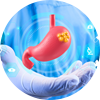
Gastroduodenal ulcer disease is a disease that affects the lining of the stomach or duodenum (the initial part of the small intestine). It arises as a result of an imbalance between aggressive and protective factors. When the protective layer of mucus is weakened, due to the increased production of hydrochloric acid, the mucous membrane may be affected and, subsequently, an ulcer may develop.
Symptoms:
Factors increasing the likelihood of an ulcer:
If you suspect a stomach ulcer, do not hesitate too long to see a doctor. You will avoid unpleasant complications such as bleeding, penetration (deep penetration of the ulcer), perforation (puncture of the stomach wall) or stenosis.
Conservative treatment is complex in nature. In addition to drug therapy, it also includes regimen (physical and mental rest, reasonably long sleep, smoking ban) and dietary measures (restriction of spicy foods, coffee and alcohol).
Medical treatment:
Medicines with the active substance omeprazole, pantoprazole and famotidine can be purchased in pharmacies in a lower strength and in a smaller number of tablets without a prescription. The duration of treatment without a doctor's supervision must not exceed 14 days.
These preparations can reduce the absorption of other medicines. Therefore, consult your doctor or pharmacist.
If the presence of Helicobacter pylori is confirmed, the doctor indicates eradication therapy (a triple combination of a proton pump inhibitor with two selected types of antibiotics) for 7-14 days.
Individual herbs (e.g. chamomile, hibiscus, rapeseed, etc.) or herbal mixtures (e.g. stomach teas) can be used as additional treatment to calm the gastric mucosa.
Free according to the web portal of the Czech Chamber of Pharmacy for the public Lékárnické kapky, 29/10/2024

28. 2. 2026
Annual protective limit for deductible co-paymentsA new system of reimbursement of deductible co-payments for medicines has been in effect for more than a year. Thanks to this ...

31. 1. 2026
eVouchers in practice eVouchers are electronic vouchers for medical devices and, with their functionality, they will mandatorily replace paper vouchers from January 1, 2026.